This Rogue guide is pilched, burgled and stolen from houses and back alleys across the Internet.
We took the shiniest things we could hope to fence, gave them a lick of paint and slipped them onto here.
The guide for Scallywags below hopes to get you in and out of greatness without a trace.
We also link to a full list of other great character optimisation guides for D&D.
Contents
- Introduction
- Stats
- Races
- Class Features
- Sub Classes (Rogue Archetypes)
- Arcane Trickster
- Assassin
- Inquisitive
- Mastermind
- Scout
- Swashbuckler
- Thief
- Skills
- Backgrounds
- Feats
- Multiclassing
- Spells For the Arcane Trickster (In progress)
The Last Thing You’ll Never Hear – Core of the Rogue in 5E
“You can’t go around arresting the Thieves’ Guild. I mean, we’d be at it all day!”
― Terry Pratchett, Guards! Guards!
Ah, the lovable Rogue. The hero who shakes your hand and walks off with your watch, opens the door with a flourish, and can pick out how much money is in a pile from a glance.
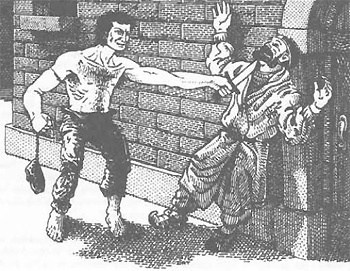
While every adventurer is a thief of sorts (stealing treasure from dungeons) not every thief is like a rogue. Not one you should turn your back on, the Rogue cleverly looks for ways around problems instead of tackling them head on.
A great addition to any party. After all, no one else is crazy enough to stick their fingers into that spring-loaded trap, or to sneak off alone and make a grab for that frost giant’s key ring.
They’re a useful person to have around and you’re pretty sure you believe them when they say that your kidneys, at least, are safe.
From this point forward, the common colour coding is being used:
- Sky Blue = Top of the line choice. Rogue optimisation starts here.
- Blue = Very strong choice for Rogue, but not amazing.
- Black = Solid choice. There are better options, but this is more than serviceable
- Purple = Not top tier. It may have niche use, but better options exist
- Red = Mechanically weak. If you feel it fits your concept, go for it, but you will likely be less effective
Remember that this is an optimisation guide. We’re looking at what is strong or effective for your Rogueish antics.
That said, if you have a fun idea for your character that isn’t based around ‘charop’, don’t be afraid to put fun ahead of numbers.
You know your game better than me, after all.
Stats:
- Str: Unless you’re going for a STR based build, you can ignore this. If you’re looking to climb things you may want some in this.
- Dex: Many of the skills you bring to the table are based on DEX. Stealth, Sleight-of-hand and Acrobatics alone make this important. Not to mention your attacks, damage, AC, Initiative. Make this as high as you can.
- Con: Hit points are just too important to let slide. If you want to stay unarmoured, it is doubly important.
- Int: This used to be your dump stat. Things have changed with Arcane Trickster, then you’ll want to pump this up.. Assassins and Masterminds get free proficiencies for tools that that call for INT checks, so any positive modifier here would be welcome for them. Inquisitives, with their use of Investigation, would also appreciate a decent score here. Aside from those archetypes, the useful skills Investigation and Arcana are attached to this, so keep that in mind before just straight dumping it to 8 outright; if you’re not using those, then dump away.
- Wis: Perception and insight are important, especially if you’re looking for traps and lies. WIS saves can be very nasty to fail so don’t let this drop too low. Inquisitives will want a decent score here too.
- Cha: Governs useful skills like Deception, Persuasion and Intimidation. If you’ve been nominated as the party ‘Face’ you’ll want some points here. Assassins, Swashbucklers, and Masterminds, in particular, will want a decent positive modifier here. If the above isn’t required of you, be happy with an 8 or 10 here.
Best Rogue Races:
Anything with +/Dex/Con is good, and any other defensive bonuses.
Ideally you’re looking for something with +Dex and potentially Darkvision. You’ll be skulking about a fair bit in the shadows and don’t want to impose any penalties on yourself.
- Aarakocra: [+2 Dex, +1 Wis] Flight at level one. The bonus is in the right spot. No Darkvision, but if you’re outside with room to fly this can be excellent. Speak with your DM first as I know some don’t allow this one. [EEPC]
- Aasimar [+1 Wis & +2 Cha] This diety race is better suited to a Paladin or even a Warlock. [VOLO]
- Bugbear [+2 Str and +1 Dex.] Darkvision, +5ft reach (!), stealth skill, and extra surprise damage. Awkward stats, but overall this is pretty sweet.
- Changeling [+2 Cha and +1 Dex or +1 Int]. Proficiency in two social skills, 2 extra languages, 1 extra tool proficiency with double bonus (thieves tools is best), a defensive reaction ability, and the amazing Change Appearance action. Downsides are they don’t get darkvision, can’t Change Appearance into small size or change your clothing, and Unsettling Visage competes with Uncanny Dodge for your reaction.
- Dragonborn [+2 Str, +1 Cha] Even if you’re considering a Strength based Rogue, you’ll be getting some abilities and traits that don’t help much. No dark vision hurts you a bit here too.
- Dwarf: [+2 Con] As a Dwarf you’ll be gaining darkvision, advantage/resistance to posion which is nice. The parts that aren’t helpful include proficiency with some non-finesse weapons and a reduced speed.
- Mountain Dwarf [+2 Str] If you’re going for an enforcer style Strength rogue this isn’t too bad.
- Hill Dwarf [+1 Wis] Extra wisdom and increased hit points aren’t what you should be looking for in a rogue.
- Duergar [+1 Str] [SCAG] Increased darkvision range is excellent for a rogue. Advantage against illusions, bein charmed or paralyzed. The real fun comes in at level 3 and 5 where you’ll get enlarge/reduce and invisibility on yourself.
- Elf [+2 Dex] All the elf variants get the +2 Dex you’re looking for plus Darkvision. Advantage vs Charm, immunity to magic sleep, and Perception proficiency are good bonuses too.
- Wood Elf [+1 Wis] While the Wisdom isn’t super handy, you’re loving this for the extra speed, longbow proficiency, and easier access to hiding.
- Drow [+1 Cha] +1 CHA is valuable to a lot of Rogue builds. Drow Magic is great: Faerie Fire is straight-up advantage, and Darkness is obviously useful for setting up real pain. The only issue is Sunlight Sensitivity, you’ll be working in shadows mostly… or have a broad brimmed hat maybe.
- High Elf [+1 Int] +1 INT is a good attribute bonus for Arcane Tricksters and Inquisitives. Longbow proficiency is awesome; you can still Sneak Attack with it, and you get the same damage as the light crossbow but MUCH better range (150/600 vs. 80/320). And then arguably the best of them all, the free cantrip, allowing Rogues who aren’t Arcane Tricksters to experience the awesomeness of Minor Illusion or Booming Blade! (You Assassins can start panting heavily about the latter, in particular.) Or, you know, being an actual Arcane Trickster with an extra cantrip works just as well. Extra language can be handy, too.
- Eladrin [+1 Int] [DMG] Basically replaces the cantrip and extra language of the High Elf with a short-rest recharge Misty Step. Depending on your build, that may actually be a worthwhile trade. Your lovely +1 INT and longbow proficiency are still there.
- Firbolg [+2 Wis, +1 Str] Detect magic or an improved disguise self per long rest, bonus action invisibility per short rest, and you can speak with critters & plants. Good abilities for a Str-based rogue, but no darkvision.
- Genasi: [+2 Con]
- Air Genasi: [+1 Dex] Good stats, plus levitate once per long rest, and you can hold your breath forever. No darkvision.
- Earth Genasi: [+1 Str] Pass without trace, once per long rest, and ignore rocky difficult terrain. You could probably make a Str-based rogue with this, with pass without trace making up for a low Dex score for stealth. No darkvision.
- Fire Genasi: [+1 Int] Darkvision, fire resistance, some fire spells.
- Water Genasi: [+1 Wis] Acid resistance, amphibious, swim speed, some water spells. No darkvision.
- Gnome [+2 Int] 25 ft speed, darkvision, advantage on all mental spell saves. Only one subrace is worth it.
- Forest Gnome [+1 Dex] the minor illusion cantrip. These guys make great Arcane Tricksters.
- Rock Gnome [+ 1 Con] Con instead of Dex and worse subracial features. They should just go wizard instead.
- Deep Gnome [ +1 Dex] [SCAG] Great Arcane Trickster stats with 120ft Darkvision and situational advantage on Stealth. Same advantage on saving throws vs magic and 25ft speed as other gnomes. They also have access to a fantastic racial feat that grants at-will nondetection plus one casting of blindness/deafness, blur, disguise self each per long rest.
- Goblin: [+2 Dex and +1 Con] Small but still has 30ft speed, darkvision, limited minor extra damage vs larger foes, and bonus action disengage or hide (which is redundant for rogues). Good stats, but features are uninspiring.
- Goliath : [+2 Str and +1 Con] Athletics proficiency and a once per short rest damage mitigator that doesn’t scale. You could probably make a Str-based rogue with this, I guess, maybe. No darkvision.
- Half-Elf: [+2 Cha, and +1 to ???] They have darkvision, two extra skills, one extra language, advantage vs charm saving throws and immunity to magical sleep.
- Halfling [+2 Dex] +2 DEX, just like the Elf, makes for effective Rogues of all stripes. Small size is no big deal as far as weapons go, since you can wield all finesse weapons and light and hand crossbows with the best of them. The only knocks on you are (a) lack of Darkvision (hope you find some Goggles of Night soon), and (b) your slow 25-foot speed, but even the latter is mitigated by the fact you can just move straight through anyone bigger than you. And Lucky is nice protection against those dastardly 1s on the d20.
- Stout Halfling [+1 Con] Resistance to poison is nothing compared to the Lightfoot’s stealthiness. Pass.
- Lightfoot Halflings[+1 Cha] Anyone bigger than you gives you cover to hide. Awesome.
- Ghostwise Halflings [+1 Wis] [SCAG] +1 WIS and telepathy. Better than poison resistance for Rogues, I suppose, but the Lightfoot’s stealthiness is just too good.
- Half-Orc: +2 Str and +1 Con. Like the Dwarves, Half-Orcs are made to smash, not to sneak. For a Str-based rogue, you will want to multiclass or pick up a feat to improve your armor. At least Half-Orc rogues benefit from Darkvision, Relentless Endurance, and Savage Attacks.
- Hobgoblin: +2 Con and +1 Int. Darkvision, two martial weapon proficiencies, a limited bonus to missed attacks/failed rolls. Not rogue material.
- Human [+1 to All scores] to every stat is more beneficial to a skill monkey class like the rogue than others, but even so you could still do better. No darkvision.
- Variant Human [+1 to ?? and Dex and a feat] +1 to two stats. Grab a skill and one of the recommended feats and go to town. No darkvision.
- Kenku: +2 Dex and +1 Wis. Forgery expert, 2 extra roguish skills, and sound mimicry make for a natural rogue, but no darkvision. The roleplaying sounds like a headache (incapable of creativity, can only speak by mimicking previously heard sounds).
- Kobold: +2 Dex and -2 Str (not a typo, that’s a minus). Small but still has 30ft speed, darkvision, limited ability to grant advantage to allies by groveling, and sunlight sensitivity. Even with the Dex and darkvision, kobolds are only for players who want to roleplay a serious underdog.
- Lizardfolk +2 Con and +1 Wis. No attack stat, no way.
- Orc +2 Str and +1 Con. Darkvision, bonus action sprint (made redundant by Cunning Action) and intimidation. Mediocre Str-based rogues.
- Shifter (UA: Races of Eberron): All shifters get +1 Dex, darkvision, Perception proficiency, and 1 minute of shifting (character level+Con bonus temp hp) per short rest.
- Beasthide: +2 Con, Athletics proficiency, and (+1d6 temp hp and +1 AC) while shifting. Great for melee rogues.
- Longtooth: +2 Str, Intimidation proficiency, and gain strength-based 1d6 bite attack while shifting. Can’t Sneak Attack with the bite.
- Swiftstride: +1 Dex and +1 Cha, Acrobatics proficiency, +5 feet speed, and while shifting get additional +5 feet speed plus a reaction to move 10 feet away from adjacent enemies without triggering opportunity attacks. Awesome for ranged rogues, but for Scouts the reaction ability is made completely redundant by the Skirmisher ability.
- Wildhunt: +2 Wis, Survival proficiency, and while shifting get a fairly weak tracking ability. This is fine, I guess.
- Tabaxi +2 Dex and +1 Cha. Darkvision, limited double speed, climb speed, perception and stealth. Can’t ask for more. [VOLO]
- Tiefling [+1 Int and +2 Cha] +1 Int and +2 Cha. While thematically having a Tiefling rogue makes a lot of sense, mechanically it’s a weak choice. Darkvision, fire resistance, and some spells don’t make up for a lack of an attack stat.
- Tiefling Variant [+1 Int and +2 Dex] [SCAG]
- Triton: +1 Str, +1 Con and +1 Cha. Amphibious, some water spells, and cold resistance. No good for most except maybe Str-based rogues, but no darkvision. [VOLO]
- Warforged (UA: Races of Eberron): +1 Con. +1 AC, advantage vs posion saves, resistant to poison damage, immune to disease, don’t need to breathe or sleep, fully aware during long rests, and (for single classed rogues) AC = 11 + Dex + proficiency bonus. Wow!
- Envoy: +1/+1 to two ability scores of your choice, +1 skill proficiency, +1 tool proficiency, +1 language, doubled proficiency with one tool (Theieves Tools are best) that is integrated with your body. Double wow! Only downside is no darkvision.
- Juggernaut: +2 Str, strength-based 1d4 unarmed strikes, powerful build. Not for rogues.
- Skirmisher: +2 Dex, +5 feet speed, and move stealthily at full pace when traveling alone for over 1 hour (which is useless). No darkvision. Honestly, just pick the Envoy instead.
- Yuan-ti Pureblood +2 Cha and +1 Int. Darkvision, suggestion, magic resistance(!), and poison immunity(!). Powerful package, just not for rogues.
More to consider on Rogue Races

Something to think about with racial stats and abilities: Later in the game, they won’t matter as much.
At 15th level, that +1 to your stat has less impact in overall performance.
At lower levels though, the difference is much more noticeable.
5e is flat out a harder game at low level than either 3.x or 4e were. It is less forgiving, and getting dropped is really, really easy.
Keep that in mind when looking at races. Some races might not have the “oomph” when it comes to doing to damage, but a lot of the survivability perks that they do have will come in really handy during those difficult low levels.
Rogue Class Features
- Hit Dice: 1d8 per level (+ CON) isn’t dangerously low. You’ll be playing around the edges and trying not to be the main focus of your enemies.
- Armour Proficiency: Light armour keeps you mobile and stealthy which is perfect for a DEX build.
- Weapon Proficiency: All simple weapons, plus the hand crossbow, longsword, rapier and shortsword. All that matters is what you can Sneak Attack with, and this covers it all, so good for you. (Note on the longsword proficiency, if you care, there’s at least one magical longsword that is a finesse weapon and thus works with Sneak Attack.)
- Saving Throws: DEX is a common enough save, expect to make it often. INT is less common, in fact it’s the least common save.
- Skills: You get four skills from a solid list. We both know you’re going to choose Stealth, the rest of your choices are all really solid: Acrobatics, Athletics, Deception, Insight, Intimidation, Investigation, Perception, Performance, Persuasion, Sleight of Hand. See the skills section below for more insights into what to pick here.
- Tools: Thieves’ Tools. One of the best and most useful tools in the game. Having proficiency will let you add your proficiency bonus to disarming traps, picking locks, and maybe even hotwiring a wagon.
- Sneak Attack: Bonus damage that is triggered if you have Advantage, or if another enemy of the target is within 5 feet of it, that enemy isn’t incapacitated, and you don’t have Disadvantage on the attack roll. This is great if you have a front line who will be up in the enemies’ grill.
- Note: You don’t have to be standing anywhere near your target. They just need to be near an enemy (probably one of your allies) and you can’t have Disadvantage on the attack. You do not need to “flank” a target like you did in previous editions, and I’ve decided to stop using that word when discussing Rogues so as to avoid confusion. Note that Sneak Attack can only be used once per turn (not per round). This means you can trigger it once during your turn on your first successful attack, and once during another creature’s turn with your Reaction (usually with a successful Opportunity Attack). When you score a critical hit, you roll all of the attack’s damage dice twice and add them together. This includes the bonus damage dice from Sneak Attack, and so Rogues tend to deal massive critical hit damage. Its also noteworthy that Sneak Attack is limited to finesse or ranged weapon, which prevents many multi-class combinations from being worthwhile (see below).
- Expertise (1st Level): You didn’t NEED to be better at some skills, but you are. Good job! You and the Bard are going to be the ‘Skill Monkeys’.
- Thieves’ Cant: Fluff. But with some coaxing, your DM may find great ways for you to put it to good use. MonarchsFactory has a great video on using Thieves’ Cant in a game. Plus it’s free so you can’t hate that.
- Cunning Action (2nd Level): Dash, Disengage or Hide as a bonus action. Simply one of the best features in the game. Dart in, attack in melee, Disengage and move out. Or cover twice the real estate other characters would with a full move and a Dash, darting well out of the movement capabilities of most melee enemies while you hit and run them to death. Or while hidden: Attack, move, Hide and repeat, getting advantage on every attack. So many possibilities, all of them exciting and keeping you on the move and hard to pin down.
- Roguish Archetypes: discussed in the next section.
- Ability Score Improvement (4th, 8th, 10th, 12th, 16th, 19th Level): A goodly amount of improvement. Max out that DEX as soon as possible. Take a feat if it’s part of your build or you’re looking to bump an Odd Stat into Even.
- Uncanny Dodge (5th Level): Trade in your reaction to halve the damage you take from one attack. Great against a critical hit or other hard hitting big enemies. Less usefull against multiple enemies or multiple attacks.
- Expertise (6th Level): Two more skills to get proficiency in. Excellent!
- Evasion (7th Level): A great ability that makes you amazing with any DEX save. You negate the damage altogether if you succeed, and even if you fail, you take just half damage. Great for setting off traps or avoiding Fireballs.
- Reliable Talent (11th Level): Guarante yourself at least a roll of 10 with all your proficient skills and tools. Now you’re always a certain level of stealthly/charming/acrobatic at a minimum. Remember there’s no such thing as a critical fail (at least by the rules as written) for a skill check. Though you may want to check with your DM on this one.
- Blindsense (14th Level): This seems great until you realise the creature needs to be within 10 ft of you. If that’s the case, it’s probably too late.
- Slippery Mind (15th Level): This saves you from needing to get a Feat for improved Wisdom saving throws. At this stage of the game Wisdom saving throws and being charmed can be devastating.
- Elusive (18th Level): As long as you aren’t incapacitated, nobody can get advantage on attacks against you. This isn’t very exciting for 18th level but it’s some really good survivability.
- Stroke of Luck (20th Level): If your attack misses a target within range, you can turn the miss into a hit. Alternatively, if you fail an ability check, you can treat the d20 roll as a 20. Assassins actually like this capstone a lot, since they want to make sure their surprise alpha strike connects. For other Rogues, it’s nice, but they could take it or leave it.
Roguish Archetype: Rogue Subclasses
Arcane Trickster [PHB]

Some rogues enhance their fine-honed skills of stealth and agility with magic, learning tricks of enchantment and illusion.
These rogues include pickpockets and burglars, but also pranksters, mischief-makers, and a significant number of adventurers.
- Spellcasting (3rd level): Like the Eldritch Knight, you’re a 1/3 caster. You get 2nd-level spells at Lv. 7, 3rd-level at Lv. 13 and finally top out at 4th-level spells at Lv. 19. While you wont have access to higher level spells, your skills and other abilities should help make up the gap.
- Mage Hand Legerdemain (3rd Level): Invisible mage hand controlled with your Cunning Action? This has limitations that I’m sure your imagination can overcome. Disable traps, pick pockets and open locks without risking your personal safety.
- Magical Ambush (9th Level): Makes spells while hidden more effective. Starting at 9th level, if you are hidden from a creature when you cast a spell on it, the creature has disadvantage on any saving throw it makes against the spell this turn.
- Versatile Trickster (13th Level): Magically flip people the bird so you can get sneak attack without needing a big dumb fighter nearby.
- Spell Thief (17th Level): Once per Long Rest you can prevent and later recast a spell. So it’s a fancy version of Counterspell with the second part of recasting only working if it’s a level 4 spell or below.
Assassin [PHB]
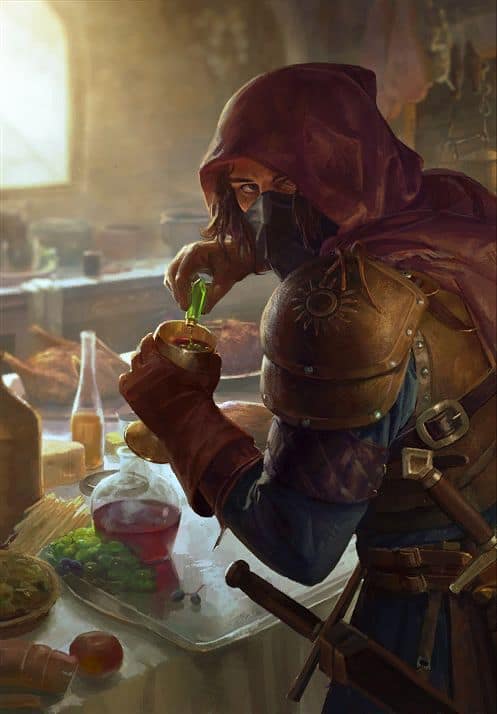
The Rogue Archetype all about dealing damage to unsuspecting foes.
Your first and last features let you do incredible damage on the first turn of combat.
The rest are all about getting into a favourable position using deceit and disguises.
Maybe you’ve got the creativity to get up close and betray enemies (and thus get Surprise) but some campaigns or dungeon crawls may not offer that opportunity often.
- Bonus Proficiencies (3rd level): Poisoner’s and Disguise Kit. The crafting rules are a little lacklustre. You can use the poisoner’s kit to harvest poison from some monsters though you may want to discuss with your DM what the crafting will look like in your game.
- Assassinate (3rd level): Advantage against creatures who haven’t acted (ie, if you win Initiative) and auto-critical hits against surprised enemies. This is all about front-loading that damage into your first attack. Surprise can be harder to set up, though it’s well worth it.
- Infiltration Expertise (9th level): False identities and the ability to create them will highly depend on your campaign. Limited uses in typical dungeons. Obviously much better in a more political campaign.
- Impostor (13th level): Now instead of creating a false identity you can steal someone elses, much better in political or ‘civilised’ campagin. Some DMs may have given you this benefit with a good Deception skill and a Disguise Kit anyway.
- Death Strike (17th level): You’re trying to get all the surprise you can already. Surprise doesn’t impact their ability to make a saving throw. However now your guaranteed critical (Due to Assassinate) damage will doube once you’ve rolled the dice.
Inquisitive [XGE]
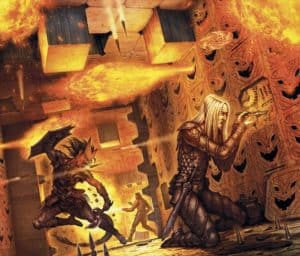
You’ve been watching Sherlock, reading Agatha Christie and dreaming of CSI Miami.
This detective style Rogue is all about spotting things and understanding others.
Make sure you take proficiency in Insight, Perception and Investigation (and Expertise) as you have a few features key off these abilities. Wisdom should be your secondary stat here.
- Ear for Deceit (3rd level): Whenever you make a Wisdom (Insight) check to determine whether a creature is lying, treat a roll of 7 or lower on the d20 as an 8. This helps you root out audible lies. As written, this doesn’t help with your Insightful Fighting. Becomes useless once you get Reliable Talent at 11th level (assuming you’re proficient in Insight).
- Eye for Detail (3rd level): Lets you use your Bonus Action to perform a Wisdom (Perception) or Investigation (Intelligence) check. Not fancy but could be helpful.
- Insightful Fighting (3rd level): Bonus action to make an Insight check (vs their Deception check). A good way to guarantee Sneak Attack even if you don’t have advantage on the attack roll, but not if you have disadvantage on it. Lasts a full minute or until you use this feature again. Similar to the Vengancy Paladin’s Vow of Enmity but you need to make a roll.
- Steady Eye (9th level): Enter your Mind Palace and get advantage on any Wisdom (Perception) or Intelligence (Investigation) check. Only works if you move half your speed or less.
- Unerring Eye (13th level): Instead of Detect magic or Detect Evil you can ‘Detect Something Off’. You sense that an effect is attempting to trick you, but you gain no insight into what is hidden or into its true nature. Limited by your Wisdom modifer uses per long rest and not super helpful in combat as it takes a full action.
- Eye for Weakness (17th level): Adding +3d6 damage whenever you hit the focus of your Insightful Fighting. Boosts this into a better Hunter’s Mark essentially.
Mastermind: [SCAG]
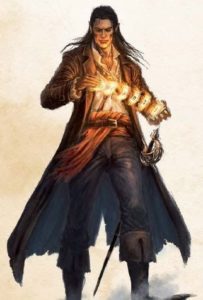
This is the charming tactition who can manipulate enemies. Stronger in a campaign based around intrigue and politics.
This leans closer to the support role as you’ll be assisting allies in combat through granting advantage and giving what would amount to Meta-gaming knowledge of enemies.
You may want to consider a Bard if that’s how you want to play.
- Master of Intrigue (3rd level): Proficiency with the disguise kit, the forgery kit, and one gaming set of your choice. You also learn two languages. You can also mimic accents and tics after 1 min of study. Helps you blend into new towns but limited use in dungeons.
- Master of Tactics (3rd level): You can now use Help as a bonus action within 30 feet of you. Stay back and give the Barbarian advantage every turn, does use up your cunning action though.
- Insightful Manipulator (9th level): Spend 1 minute out of combat a creature to learn a bunch of information about it. Find out if it has higher, equal, or lower Int, Wis, Cha or class levels than you, or perhaps some personal info. The usefulness of this is quite limited, especially in a dungeon delve. In a political/social campaign where you need to guage how easy it is to lie to and manipulate someone this is much stronger.
- Misdirection (13th level): Very situational. If you’re ever in the position where you are targeted by an attack while a creature within 5 feet of you is granting you cover against that attack, then you’re probably standing in the wrong spot.
- Soul of Deceit (14th level): Great fun in a social campaign where NPCs have the ability to read minds. Hide your thoughts from telepaths and detect thoughts. Less than useless in a dungeon crawl campaign.
Scout: [XGE]
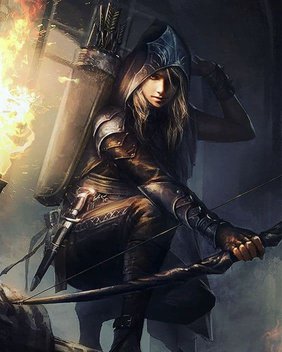
A mundane option if you disagree with Rangers having spells.
Considered massively under powered until level 13.
When you do hit lvl 13 some greatness happens and this archetype suddenly becomes awesome and an ace at leading party ambushes.
Whether you’ll want to take this archetype at all depends fully on whether you’re willing to put up with 12 levels of mediocrity.
Of course, if you’re starting a campaign at high level, then that concern goes away …
- Skirmisher (3rd level): Move up to half your speed ignoring opportunity attacks when an enemy gets too close. Keeps you out of harms way, though it competes with your Uncanny Dodge once you hit level 5.
- Survivalist (3rd level): You gain proficiency in the Nature and Survival skills if you don’t already have it. Your proficiency bonus is doubled for any ability check you make that uses either of those proficiencies.
- Superior Mobility (9th level): A speed boost of 10ft. Boosts Skirmisher by 5ft, helpful for your Dash/Disengage too.
- Ambush Master (13th level): You have advantage on initiative rolls. You’ll grant a round of advantage to allies vs the first creature you hit in the first round. The Alert feat will compliment this nicely.
- Sudden Strike (17th level): An extra attack as a bonus action plus a second Sneak Attack on a second target. The only way to Sneak Attack 2 enemies on your turn. Great for taking out small patrols before they spot you and your party. Overlaps a bit with the Crossbow Expert feat, if you have it.
Swashbuckler: [SCAG/XGE]
“What Ho!
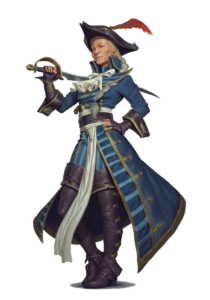
Raise your blade foul knave!” the Swashbuckler is about darting in and out of melee combat with a charming smile.
Every Swashbuckler feature is both useful and thematically consistent, providing defence, offence, mobility and even some awesome battlefield control and out-of-combat utility.
A Swashbuckler excels in single combat, and can fight with two weapons while safely darting away from an opponent. If possible you’ll still want a tank nearby to run interference if you can.
- Fancy Footwork (3rd level): During your turn, if you make a melee attack against a creature, that creature can’t make opportunity attacks against you for the rest of your turn.
- Rakish Audacity (3rd level): Bonus to initiative and easier ways to get Advantage.
- Panache (9th level): In combat this grabs a creatures attention as you challenge them to a duel. Outside of combat you’ve just made yourself a new frend… for 60 seconds. Unlike Charm Person or Friends they won’t know you’ve beguiled them.
- Elegant Maneuver (13th level): Bonus action to gain advantage on the next Dexterity (Acrobatics) or Strength (Athletics) check you make during the same turn. With Reliable talent and Expertise, you can use this to pretty much auto-escape any grapple. Combine this with Fancy Footwork for a vertical getaway after you stab the enemy (climbing and jumping in combat costs movement, not actions).
- Master Duelist (17th level): Once per short rest you can turn a miss into a reroll with advantage. Similar to the lvl 20 capstone ability but not a guarantee.

Thief: [PHB]
If you want to do some ‘Second story work’ and be good at using items you’ve… acquired then this could be the archetype for you.
It’s more effective at later levels and depending on how many traps you need to disarm during combat.
- Fast Hands (3rd level): You can use the bonus action granted by your Cunning Action to make a Dexterity (Sleight of Hand) check, use your thieves’ tools to disarm a trap or open a lock, or take the Use an Object action. This is handy though may depend on your DM on what actions you can take in combat (Pickpocketing). Using objects like potions, ball bearings, and pouring flasks of oil may be handy. Use of the Healer feat makes this much better if you’re keen to support.
“As an action, you can spend one use of a healer’s kit to tend to a creature and restore 1d6 + 4 hit points to it, plus additional hit points equal to the creature’s maximum number of Hit Dice. The creature can’t regain hit points from this feat again until it finishes a short or long rest.” - Second-Story Work (3rd level): Climbing and climbing speed doesn’t come up often enough to make this useful. There’s some discussion on if the extra distance (1-5 feet based on Dex modifer) is actually broken or just bad. Speak with your DM about this one.
- Supreme Sneak (9th level): Advantage on Stealth when you’re moving at half-speed. Well worth it if you’re doing some cautious scouting.
- Use Magic Device (13th level): Using Instruments of the Bards and staffs and wands normally reserved for spellcasters can be nice. You ignore all class, race, and level requirements on the use of magic items. (Using spell scrolls doesn’t require this, according to DMG p. 139.)
- Thief’s Reflexes (17th level): It takes a long time to get here, but you can take two turns during the first round of any combat. That means you get two Actions, two Bonus Actions, and two movements. An incredible way to get work done in that first round.
Final Thoughts:
Skills & Backgrounds:
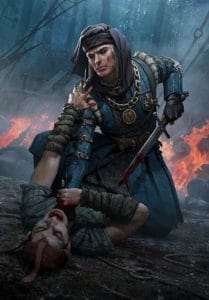
You get to pick four from the following, the most of any class at Lv. 1.
Your background will give you even more skill proficiencies, which are not restricted to this list.
Your race may also give you more chances to pick skill proficiency, again not limited to this list.
In any case, barring the presence of a Lore Bard and characters with questionable feat choices, you are the skill monkey of the group. Also, don’t forget that Expertise can make picking even a skill attached to your “dump stats” worthwhile.
Don’t be afraid to use your skill choices to customize your character a bit. Even mechanically weaker skills can still offer a good benefit to the party as a whole.
Class skills:
- Acrobatics (DEX): You’ll be using this a lot. Resisting grapples and shoves. Balancing on things and maybe even running along rooftops. Some DMs will let you use this as a substitute for many Athletics checks, too. Pretty damn important for all Rogues.
- Athletics (STR): You’re looking at this for climbing if you’re keen on doing some second story work. If you must choose, however, Acrobatics is a higher priority (and your DM may even let you use Acrobatics on some climbing-related checks, depending).
- Deception (CHA): A great skill for social interactions and all kinds of skill checks. You’ll be using this all the time to tell lies, pass yourself off in a disguise convincingly, hide your intentions, give false reassurances, fast-talk people, con merchants, gamble effectively … just so many possibilities. This skill particularly fits the modus operandi of Assassins and Masterminds, who even have class features that rely on this skill; this is mandatory for those archetypes, who should also strongly consider Expertise in this.
- Insight (WIS): Work out if someone is trying to deceive you. You’ll want to know if people are falling for your tricks… and that they aren’t giving you a taste of your own medicine. Essential (with Expertise) for Inquisitives, who have their major combat feature keying off this skill. Also pretty suitable for Masterminds. If someone else in the party, with better WIS, has this skill then it’s not nearly as urgent for you.
- Intimidation (CHA): Be the rough and ready rogue coercing people into giving you the information you ask for.
- Investigation (INT): Looking at crime scenes and acting like a detective. Used to look around rooms, search for clues and possible secrets, interpret forensic evidence. Perception may let you spot a trap but Investigation will give you more information about it. It may also be used to deduce how a trap can be dismantled, before you go poking around on it with your Thieves’ Tools. In any case, a pretty useful skill. Inquisitives have major class features that deal with the skill, so it’s mandatory for them (preferably with Expertise). Arcane Tricksters who are more likely to boost INT will also want to give it particular consideration.
- Perception (WIS): When the DM calls for a Perception check, a low number is never good. Used to detect hidden enemies and traps, bust someone trying to use Sleight of Hand, among many other things. If there was ever a mandatory skill for everyone, it’s this. Inquisitives will want to Expertise it, for sure, and it’s not a bad idea for any other Rogues to do so, for that matter.
- Performance (CHA): You’re not the Bard, If you need money you don’t play music to get it.
- Persuasion (CHA): This is if you want to play ‘Good cop’ when the Barbarian plays ‘Bad Cop’. You’ll probably want to lean on Deception more for your social interactions but it depends on how you play, this one typically reflects more honest intentions. Someone in the party definitely needs this as the “party face.” And if there’s not a Bard, Paladin, Sorcerer or Warlock in the group, that “party face” could very well be you. Swashbucklers have a rather potent class feature riding on this skill and should consider it mandatory and Expertise it.
- Sleight of Hand (DEX): Yes this includes pickpocketing people but it can be so much more. Drop the magical equivilent of a hand grenade into the pocket of your enemy, slip some false evidence on someone, canceal a weapon on your person when entering the kings court, or maybe even lace a drink with some poison. Assassins, in particular, really love using this skill. Arcane Tricksters have a lot riding on this with their mage hand class features.
- Stealth (DEX): You chose Rogue, now you get to play in the shadows. Essential for Thieves, Assassins, and Arcane Tricksters, who all have class features that rely on or key off of this skill. Assassins and Arcane Tricksters, in particular, should Expertise it, too. Swashbucklers and Masterminds don’t necessarily need it, but should still strongly consider it.
Non Class Skills:
- Arcana (INT): Once you’re past mundane locks and traps you’ll need some magical know-how to detect and disarms magical traps. Arcane Tricksters, in particular, should strongly consider pursuing.
- Survival (WIS): Assassins may want to track a target though it’s rather circumstantial.
- Animal Handling (WIS): The only trick you want to teach an animal is, “Play dead”.
- Medicine (WIS): You’re more of an anti-medicine kind of person.
- Nature/Religion/History (INT): Books are the keys to knowledge… but that’s why you have lockpicks.

Backgrounds:
Your background generally gives you 2 skills, maybe a language or two, maybe a tool or two, a special perk, and a small amount of goods/gold.
They can help flesh out your character a bit, offer some mechanical help, and help you better define where your Rogue is coming from.
Keep in mind that if a background gives you a skill you already had from your class or race, you get to pick any other skill to replace it (including a non-class skill). This is a good way to pick up, say, Arcana. This also applies to tools; if you pick a background that gives you Thieves’ Tools proficiency, you get to pick ANY tool proficiency in its place. And likewise with any tool proficiencies you get once you choose your archetype.
Acolyte: [insight/religion] An atypical choice that may make for an interesting backstory. Religion as a skill isn’t the greatest, but Insight is decent. The extra languages can be useful, though it is not a traditional Rgoue specialty. The perk is fun and flavourful, though possibly campaign/DM specific.
Charlatan: [deception/sleight of hand] Deception, Sleight of Hand, Disguise Kit, Forgery Kit. Terrific skills, fitting tool proficiencies, plus you have an alter-ego, you can pretend to be any other background on this list. You could potentially even forge any documents or papers you need. A great example is a fake arrest warrants for your worst enemies, or steamy correspondance from someone you need humiliated.
Criminal: [deception/stealth] Stealth and Thieves Tools are very solid mechanical choices, due to you already having them. This is as good as a Rogue background can get, the skills and all. Work with your DM to get your criminal contact that you can send messages and requests to from just about anywhere. If you’re an Assassin who really loves using poison, this may be the most reliable means of getting it that exists. The Spy variant is basically just a label to make this background’s pretty attributes legit.
Entertainer: [acrobatics/performance] Acrobatics, Performance, Disguise Kit, Musical Instrument (one). One good skill, one not. The free lodging and modest or comfortable lifestyle is nice. The Gladiator variant is pretty meaningless for you, though.
Folk Hero: [animal handling/survival] Animal Handling, Survival, Artisan’s Tools (one), Vehicles (Land). Two bad skills, although at least having safe houses among commoners is nice?
Guild Artisan: [insight/persuasion] Insight, Persuasion, Artisan’s Tools (one), one language.Two solid skills, plus a feature that gets you free lodging and food and the chance at some real political clout or connections. Assassins looking for poison may want to get in good with apothecaries of questionable morality, ahem. The Merchant variant lets you replace Artisan’s Tools with Navigator’s Tools and start with a mule and cart, while still getting the sexy benefits of guild membership, probably better since you’re an adventurer on the move.
Hermit: [medicine/religion] Medicine, Religion, Herbalism Kit, one language. Yeah, um, moving on.
Noble: [history/persuasion] History, Persuasion, Gaming Set (one), one language. Persuasion good, History bad. At least you have some political clout and connections, though. The Knight variant replaces those connections with retainers, who are probably more trouble than they’re worth.
Outlander: [athletics/survival] Athletics, Survival, Musical Instrument (one), one language. Marginal skills at best, although the guaranteed success on foraging is good if you’re stuck in the wilderness somewhere.
Sage: [arcana/history] Arcana, History, two languages. Other than Arcana for an Arcane Trickster, there’s nothing for you here.
Sailor: [athletics/perception] Athletics, Perception, Navigator’s Tools, Vehicles (Water). One good skill and one OK one. Free passage on a ship is nice, but the Pirate variant‘s Bad Reputation and ability to get away with misdemeanors and petty crimes left and right is probably more fitting for many Rogues … not to mention incredibly fun. Arr!
Soldier: [athletics/intimidation] Athletics, Intimidation. Two decent skills, land vehicle proficiency could potentially be useful, lackluster tool and equipment. Choose Officer or Scout and go bully the local town’s guard with your rank.
Urchin: Sleight of Hand, Stealth, Disguise Kit, Thieves’ Tools (free pick). Terrific skills and tool proficiencies. (Plus a pet mouse!) The faster intra-city travel feature is pretty weak, though, keeping this background a full step below the likes of Charlatan and Criminal/Spy.
SCAG Backgrounds
City Watch: [Athletics/Insight] two languages. The city watch may be the last place you’d expect to find a Rogue, but this ain’t bad at all. You can pretty much spot out any watch outpost and criminal den anywhere. And you could become a corrupt watchman and get in good with the criminal element. The Investigator variant is actually quite nice, replacing Athletics with the overall more useful Investigation. Sounds great for an Inquisitive.
Clan Crafter: [History/Insight] Artisan’s Tools (one), Dwarvish language. Ooh, you get to be friends with Dwarves. How about … no.
Cloistered Scholar: [History, another knowledge skill] two languages. Next.
Courtier: [Insight/Persuasion] two languages. Alright, now we’re talking. Two solid skills and an intimate knowledge of an area’s politics and government connections no matter where you go? Yeah, there’s just a few opportunities there.
Faction Agent: [Insight, one faction-specific skill] two languages. Being an agent of one of the Realms’ most powerful organizations kind of speaks for itself. Being either with the Harpers (Investigation) or, especially, their mortal foes the Zhentarim (Deception) gets you another good skill, too. The Zhentarim is likely to have easy access to poisons for Assassins.
Far Traveler: [Insight/Perception] Musical Instrument (one), one language. One good skill and one necessary one, and the opportunity for more connections with some powerful people. Very good.
Inheritor: [Survival/Arcana] Gaming Set OR Musical Instrument, one language. Eh, one good skill and one marginal skill, and the feature amounts to little more than an intriguing story hook. You can do better.
Knight of the Order: [Persuasion/Arcana] (or other weak choices), Gaming Set OR Musical Instrument, one language. Interesting note: The knight order descriptions do not mention which skill they’re attached to, so pick Arcana. Attachment to a powerful knight order, and the free shelter and succor that comes with it, make this a solid pick, if not a little dissonant for Rogues.
Mercenary Veteran: [Athletics/Persuasion] Gaming Set (one), Vehicles (Land). Decent skill set, and a guaranteed comfortable lifestyle as a mercenary. OK, I guess.
Urban Bounty Hunter: [Two of Deception, Insight, Persuasion, and Stealth] two of Gaming Set, Musical Instrument or Thieves’ Tools (pick this and get a free choice of tools, haha). All Rogue-appropriate skills and tools, and plenty of opportunities for connections from the local gangs and thieves’ guilds to members of high society. Doesn’t get much better.
Uthgardt Tribe Member: [Athletics/Survival] Musical Instrument OR Artisan’s Tools (one). Meh skills, and something similar to the Outlander’s foraging, with hospitality from your tribe or powerful allies. Probably better than Outlander, but not by much.
Waterdhavian Noble: [History/Persuasion] Gaming Set (one) OR Musical Instrument (one), one language. One wasted, skill, and some renown in Waterdeep and the North that lets you live a comfortable lifestyle on credit. Eh.
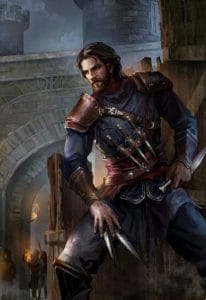
Rogue Feats:
You’re probably best off taking a +2 Dex over a feat if you already have an even number in that stat.
If it’s an odd number a feat that provides +1 can help bump it up to even and give a perk.
- Alert: Going first means you can disable enemies before they act. For Assassins it’s just about mandatory. Can’t be surprised and not giving up advantage to hidden foes are nice side-benefits that mean you don’t necessarily need to Expertise Perception (you should still be proficient though, for other applications of that skill). Variant Human Assassins would do well to take this at Lv. 1, all other races at Lv. 4. This is also highly recommended for for Scouts at Lv. 12, so they can be set up for Ambush Master to work its charm as often as possible next level. Not nearly as urgent for other archetypes, though.
- Athlete: You don’t run, you sneak and skulk. Don’t worry about this.
- Actor: Advantage on Deception and Performance checks when in disguise is situational. These features can be provided even better by Assassins or Masterminds class features.
- Charger: Cunning Action Dash + Attack is always going to be better than Charger.
- Crossbow Expert: Great if the idea you have involves hand crossbows, if not, then don’t bother. The bonus action attack is the biggest draw by far, particularly for Assassins, but also for anyone who wants two chances to land Sneak Attack on any given one of your turns.
- Defensive Duelist: Not nearly as appealing to Rogues as to other DEX-based characters. Competes directly with Uncanny Dodge for your reaction and only works against melee attacks and with a melee weapon in hand. Does outperform Uncanny Dodge at high levels in that situation, but not by enough to really make it worth the pick.
- Dual Wielder: Well, if you want to go with the classical rapier + dagger combination (or, yes, 2 rapiers), then you need this feat. At least you also get +1 AC for your troubles and can draw both weapons at once. You don’t need it if you’re perfectly content with 2 shortswords.
- Dungeon Delver: Great if your DM is a bit trap-happy.
- Durable: It’s okay. Nothing special, but it’s a good half-feat bonus.
- Elemental Adept: You’re not a Wizard or Sorcerer. (It’s not all that good for them, either.)
- Grappler: Even for a Grapple build this isn’t useful as written.
- Great Weapon Master: You don’t use two-handers.
- Healer: The basis for the Thief Healers – Thieves who use their Fast Hands to use a healer’s kit as a bonus action and dish out substantial amounts of healing and stabilise dying allies in a pinch while still getting their chance to attack. Not nearly as worth it for other archetypes.
- Heavily Armored: There are better ways to get Heavy Armour if you really want it (you don’t).
- Heavy Armor Master: You don’t wear heavy armour.
- Inspiring Leader: An excellent feat though it’s more likely to be picked up by a Bard or Paladin. This could be worth while for a Mastermind or Swashbuckler with a good CHA bonus.
- Keen Mind: The INT isn’t useful unless you need it to even out an Int score. If that’s the case, maybe take an Ability score improvement instead and split it.
- Lightly Armored: You don’t need this.
- Linguist: The other odd bump for Int, but still likely unhelpful.
- Lucky: A good all around bonus. Note that this doesn’t grant advantage, just an extra d20, so it doesn’t work with Sneak Attack.
- Mage Slayer: Fantastic if you fight a lot of spellcasters. Boost your melee damage output and saving throws vs adjacent spellcasters, including innate (and psionic) ones. Swashbucklers have an easier time fulfilling Sneak Attack conditions behind enemy lines, where the casters usually hide.
- Magic Initiate: Take Hex for more damage per hit and enemies having disadvantage on spotting you.
- Martial Adept: Very situational, maybe useful if you multiclass as a Battle Master.
- Medium Armor Master: Only STR-Rogues will care, and only if their DEX is 16.
- Mobile: Extra speed, ignore difficult terrain on Dash works well with Cunning Action, and steal the Swashbuckler’s Fancy Footwork.
- Moderately Armored: If a STR-Rogue isn’t multiclassing, this is pretty much mandatory for them. STR-Rogues who aren’t Mountain Dwarves really should multiclass with Fighter, though.
- Mounted Combatant: While the potential for advantage on all attacks (and thus Sneak Attack) is certainly nice in a campaign where a mount is actually a factor, most mounts are either too expensive and require too much time to train, or they die easily. Basically, only Paladins really care about this.
- Observant: This can be pretty game breaking if you have proficiency and Expertise in Perception and Investigation. Remember it’s only for your passive scores, however as an Inquisitive this can be godly. Passive Perception theoretically should let you spot traps or sneaking enemies without a roll. Chat with your DM about how they handle Passive Perception because it’s not often used.
- Polearm Master: There are no Sneaky Polearms.
- Resilient: If you have an Odd number CON score you can get this to boost it up and get more saving throws.
- Ritual Caster: This can cover a lot of those “nice to have” utility spells Arcane Tricksters would’ve liked but just couldn’t justify taking up a spell known for. Wizard list is the best for this feat. Especially ‘Find Familiar’ to get an invisible Imp that can Aid.
- Savage Attacker: Works ONLY on your weapon damage dice. Sneak Attack and Booming Blade dice are not helped by this feat, making it useless to you.
- Sentinel: Not good for a Rogue. You don’t want to be a target. Moves up to Blue if you have good team synergy that encourages enemies to attack them instead of you.
- Sharpshooter: Makes your ranged attacks much more effective in several ways. Crossbow Expert + Sharpshooter is generally the optimal way to maximize your damage as a Rogue.
- Shield Master: A STR Rogue may be keen on this with Expertise in Athletics. Otherwise you’re getting a lot of things competing for your Bonus Action.
- Skilled: While more skill proficiency translates to more opportunities to abuse Reliable Talent, you do kinda have enough skills anyway.
- Skulker: The usefulness of this Feat depends mostly on how closely your DM pays attention to the different types of illumination and obscured. If your DM pays close attention to these things, then this is a solid third choice Feat for a ranged Rogue behind Crossbow Expert and Sharpshooter
- Spell Sniper: You’re not adding Sneak Attack to spells so don’t worry about this.
- Tavern Brawler: An alternative for the shield master for STR based Grapple Rogues. If you have an odd Str/Con. Otherwise shield master is better.
- Tough: Not bad, but you’re probably better off taking the +2 Con if that’s a concern.
- War Caster: Resilient (CON) is higher priority for Arcane Tricksters, but extra advantage on Concentration checks is certainly nice. Blue for Arcane Tricksters who still like concentration spells.
- Weapon Master: You don’t need this, Heavy crossbows, longbows, and scimitars can be obtained in other ways, they aren’t worth the price of a feat.
Multiclassing:
Here, we’re taking a quick look at some options, along with the concept of a “dip” to grab some goodies from another class.
I’m going to leave some of the finer points of multi-classing up to the individual though, especially anything that takes away from the character being majority Rogue.
While there is a colour grade in this section remember that other options may fall into your character concept side of things than true optimisation.
- Barbarian : We discovered you can use finesse weapons while raging when we wrote our Barbarian Guide. This can be an effective Strength Rogue build. Reckless Attack works well with Sneak Attack and Fancy Footwork.
- Bard: A strong contender for a courtly Assassin. According to Sage Advice, Reliable Talent & Jack of all Trades together let you take 10 on initiative checks (and also add 1/2 of your proficiency bonus), which is crazy good for assassinate/death strike. You also get four more proficient skills, two of which will have Expertise.
- Cleric: Potentially something here Both War and Death give you martial weapon proficiencies (for longbow). Also, you can and should prepare Bless. Lv. 2 opens up: War Channel Divinity is +10 to hit, perfect for Assassins to make sure they hit when it counts. Alternatively, Death Channel Divinity still adds 9 damage onto a hit with 2 cleric levels, and Assassin Death Attack can double that to 18 since it’s directly part of the attack’s damage.
- Druid: Sneaking around in a small beast form is great but you can’t sneak attack while changed. Also you’ll be using the Dexterity of your animal form, yours should always be better.
- Fighter: A Fighting Style, More Attacks, Second Wind, Action Surges. Rogues will like these things. Riposte maneuver lets you Sneak Attack as a reaction. Remember, you can Sneak Attack each turn not just each round. Champions are also surprisingly good for Improved Criticals; crits double Sneak Attack dice! With Xanathar’s Guide To Everything, Arcane Archers are decent for ranged rogues, while Samurai pair very well with Swashbucklers.
- Monk: While martial arts and shadows sound like they would make excellent Ninja skills, these don’t really work together.
- Paladin: The real draw here is Vow of Enmity from the Vengeance oath for auto-advantage vs 1 enemy per short rest. The Extra attack and Fighting style are good, the extra Paladin features such as Lay on Hands and Smite scale with Paladin levels.
- Ranger: Ask your DM if the Gloom Stalker from Xanathar’s Guide to Everything is available. Then take that at Ranger level 3. Extra attack, movement, and damage in the first round with no conditions, plus darkvision! This single-handedly eliminates the major drawback for many race choices, having disadvantage on attack rolls in darkness invalidate your sneak attack.
- Sorcerer: Sorcery points are based on sorcerer level, so this is bad for a multiclass character. For Metamagic, Quickened Spell works with the attack action, Subtle Spell is quite thematic, and Twinned Spell gives you great bang for your buck.
- Warlock: A Hexblade Rogue can be great. You’ll want to plan ahead and have Charisma high. Hexblade’s Curse lets gives you more damage, and a wider Critical hit range. A Chain Boon with an invisible familar can help set up Sneak Attacks, Blade Boon lets you smuggle weapons into controlled areas, Tome Boon would give you more Cantrips (See the Spells Area for more details).
- Wizard: Arcane recovery works with Arcane Trickster spells, A little more ‘Gish’ than normal. Extra cantrips and ritual casting can come in handy. The Arcane Tradition at Level 2 Divination’s Lv. 2 feature is particularly awesome. Or go Bladesinger if you’re an Elf or Half-Elf.
Best Arcane Trickster Spells
The usefulness of a lot of Trickster spells frequently depends on your own imagination and roleplaying. You should be looking for spells that provide utility as your weapon damage (with Sneak Attack) will outclass the spells you have on offer.
Sneak Attack does not work with cantrips (except a few from SCAG) or spells.
You have an extremely limited number of spells, so try to pick ones that will see a lot of use rather than ones that are situational. You can’t afford to pick niche spells. You can check out this link for a handy compilation of spell lists.
(In Progress)
Regards,
[…] Sneak attack is solid, the extra skills are nice too. We have a 5E Rogue guide available if you want to learn […]
[…] be to start with a couple Rogue levels. There’s not much else on offer though. Read our 5E Rogue guide if you want to learn […]
[…] Casing the Joint – A 5E Rogue Guide by Daniel […]
Regarding multiclassing, one level of Shadow Magic Sorcerer is a top-of-the-line choice if you choose a race without darkvision, as you get 120′, plus Strength of the Grave. In addition, you get 4 cantrips and two 1st level spells, which can augment whatever type of rogue you’re building.
Rogues also have an ASI at 10th level.
Good catch. Thanks!
I would like to greatly disagree with your ranking of the kobold race because you forgot their most major racial feature: pack tactics. This trait is fantastic normally, and really elevates your character above the rest in a campaign where the dm doesn’t use the optional flanking rule. Additionally, because of their small stature, arcane trickster kobolds can cast enlarge/reduce on themselves, which makes them light enough to ride their own invisible mage hand.
Exactly. All you have to do is wait for one of your allies to move within 5 feet of a target and then you have advantage on the attack. Which gives you sneak attack. My light crossbow rogue picks foes off from a distance using that tactic.
Moderately Armored+Medium Armor Master means even a rogue can have an AC of 20 and sneak around in half plate and shield without magical items, extremely great for front line rogues since normally rogues are seen as slightly squishy, thus this helps prevent getting hit allowing one to preserve that oh so important reaction for Uncanny Dodge when it really counts or catching those that want to get away from the high damage output with an opportunity attack. To be fair, however, this was done with a Variant Human Swashbuckler so he was able to max out Dex & Charisma.
yes but an arcane trickster with studded leather armor and the shield spell can hit ac 21 making the rough even harder to pin down.
Minor comment, you can’t summon an imp with Find Familiar unless you’re pact of the tome warlock.